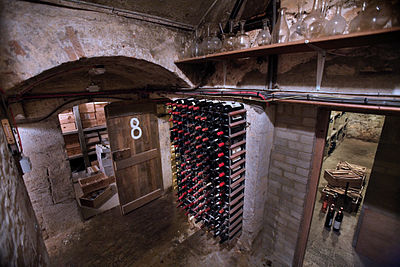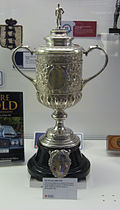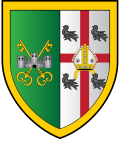| Main page | Indices | Projects |
The University of Oxford portal
The University of Oxford is a collegiate research university in Oxford, England. There is evidence of teaching as early as 1096, making it the oldest university in the English-speaking world and the world's second-oldest university in continuous operation. It grew rapidly from 1167, when Henry II banned English students from attending the University of Paris. After disputes between students and Oxford townsfolk in 1209, some academics fled north-east to Cambridge where they established what became the University of Cambridge. The two English ancient universities share many common features and are jointly referred to as Oxbridge.
The University of Oxford is made up of 43 colleges, consisting of 36 semi-autonomous constituent colleges, four permanent private halls and three societies (colleges that are departments of the university, without their own royal charter), and a range of academic departments which are organised into four divisions. Each college is a self-governing institution within the university, controlling its own membership and having its own internal structure and activities. All students are members of a college. The university does not have a main campus, but its buildings and facilities are scattered throughout the city centre. Undergraduate teaching at Oxford consists of lectures, small-group tutorials at the colleges and halls, seminars, laboratory work and occasionally further tutorials provided by the central university faculties and departments. Postgraduate teaching is provided in a predominantly centralised fashion.
Oxford operates the Ashmolean Museum, the world's oldest university museum; Oxford University Press, the largest university press in the world; and the largest academic library system nationwide. In the fiscal year ending 31 July 2023, the university had a total consolidated income of £2.92 billion, of which £789 million was from research grants and contracts.
Oxford has educated a wide range of notable alumni, including 30 prime ministers of the United Kingdom and many heads of state and government around the world. 73 Nobel Prize laureates, 4 Fields Medalists, and 6 Turing Award winners have matriculated, worked, or held visiting fellowships at the University of Oxford, while its alumni have won 160 Olympic medals. Oxford is the home of numerous scholarships, including the Rhodes Scholarship, one of the oldest international graduate scholarship programmes. (Full article...)
Selected article
The 1874 FA Cup Final was played between Oxford University A.F.C. and Royal Engineers A.F.C. on 14 March 1874 at Kennington Oval in London. It was the third final of the world's oldest football competition, the Football Association Challenge Cup (known in the modern era as the FA Cup). Both teams had previously reached the final but been defeated by Wanderers F.C. The Engineers had reached the final with comparative ease, scoring sixteen goals and conceding only one in the four previous rounds. Oxford's opponents in the earlier rounds had included two-time former winners Wanderers. The final was decided by two goals from Oxford in the first twenty minutes. Their opponents had spent two weeks training for the match, an innovative concept at the time, but were repeatedly thwarted by Charles Nepean, the Oxford goalkeeper. The Engineers were said to have missed their best back, Lieut. Alfred Goodwyn, who had been posted overseas. The 1874 final was the only occasion upon which Oxford University won the FA Cup; the team made further appearances in the 1877 and 1880 finals, but lost on both occasions. (Full article...)
Selected biography
Ian Smith (1903–1972) was a rugby union wing who played 32 Tests for Scotland and two Tests for the British Isles. Born in Australia and brought up in New Zealand, he moved to England and was educated at Winchester College, before studying at Oxford University and later Edinburgh University. At Oxford he took up rugby (having only played football at school); he captained the university team to victory against Cambridge in the 1923 Varsity Match, scoring two tries. He was eventually selected for Scotland, for whom he was eligible because of his Scottish parents. He toured with the British Isles (now known as the British and Irish Lions) to South Africa in 1924, and played all four matches in Scotland's first ever Five Nations Grand Slam in 1925. He represented Scotland until 1933 when he captained them in their Triple Crown winning season. His 24 international tries, all scored in the Five Nations or Home Nations, was an international record until 1987 and a record for the Five/Six Nations until 2011. Smith still holds joint possession of the Scottish record. (Full article...)
Selected college or hall
St Peter's College became a college in 1961, having existed as "St Peter's Hall" since 1929. It is on New Inn Hall Street, on the site of two of the university's oldest academic halls, New Inn Hall and Rose Hall, founded in the 13th century. St Peter's was founded by Francis Chavasse, Bishop of Liverpool, who was concerned at the rising cost of education in British universities. His aim was to enable students who might be deterred by the costs of other colleges to obtain an Oxford education. Its buildings include an 18th-century rectory, which houses the college's entrance and library, and the Church of St Peter-le-Bailey, built in 1874, which is used as the college chapel. There are about 350 undergraduates and 130 graduates. Alumni include the former President of Ghana Edward Akufo-Addo, the Revd W. Awdry (creator of Thomas the Tank Engine), the chef Hugh Fearnley-Whittingstall and the author Mike Carey. Mark Damazer, a former Controller of BBC Radio 4, has been the Master of St Peter's since 2010. (Full article...)
Selected image

Did you know
Articles from Wikipedia's "Did You Know" archives about the university and people associated with it:
- ... that Cheshire landowner Rowland Egerton-Warburton (pictured) arranged for his house, Arley Hall, to be designed in Tudor style while the chapel was designed in Gothic style?
- ... that Herbert Armitage James, who was headmaster of Rugby School for 14 years, had one of the best stamp collections in England?
- ... that Marrack Goulding, a former Under-Secretary-General of the United Nations, was Warden of St Antony's College from 1997 to 2006?
- ... that Clive Ponting was found not guilty of violating the Official Secrets Act by a jury even after the judge, Sir Anthony McCowan, summed up strongly in favour of the prosecution?
- ... that Ion Calvocoressi won an immediate Military Cross in Libya in 1942, and was married to the sister of Ludovic Kennedy for over 60 years?
Selected quotation
Selected panorama
Wikimedia
The following Wikimedia Foundation sister projects provide more on this subject:
-
Commons
Free media repository -
Wikibooks
Free textbooks and manuals -
Wikidata
Free knowledge base -
Wikinews
Free-content news -
Wikiquote
Collection of quotations -
Wikisource
Free-content library -
Wikiversity
Free learning tools -
Wikivoyage
Free travel guide -
Wiktionary
Dictionary and thesaurus













